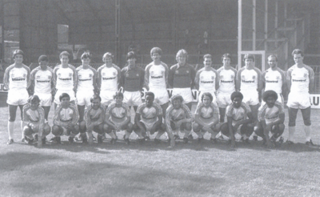
Luton Town Football Club is a professional football club based in Luton, Bedfordshire, England, that competes in the Premier League, the top level of the English football league system. Founded in 1885, they are nicknamed the Hatters, due to the historical association of the town with the hat making trade, and have played home matches at Kenilworth Road since 1905. The club's history includes one major trophy win, several financial crises, as well as numerous promotions and relegations. Between 1982 and 1992, they were a member of the First Division; they won their first major honour, the Football League Cup, in 1988. Luton Town have a long-standing rivalry with nearby club Watford.

Kenilworth Road, known affectionately as The Kenny, is an association football stadium in Bury Park, Luton, Bedfordshire, England. It has been the home ground of Luton Town since 1905. The stadium has also hosted women's and youth international matches, including the second leg of the 1984 European Competition for Women's Football final.
Andrew Edward King was an English professional footballer who played as a midfielder. He made 350 appearances and scored 92 goals in the Football League in the 1970s and 1980s, and also played abroad. He was capped twice by England at under-21 level. After retiring as a player, he had a lengthy career in management.
George Scott Martin was a Scottish football player and manager whose position was inside forward. He played over 200 times for Hull City, won an English Football League winner's medal with Everton in 1928, and served Luton Town as a player and manager.

Nathan Jason Jones is a Welsh professional football manager who is the manager of League One club Charlton Athletic. He is also a former player who played as a left-back and a midfielder.

János Kovács is a Hungarian footballer who plays for Pénzügyőr SE as a defender. He has played for MTK, Bodajk, Chesterfield, York City, Lincoln City, Luton Town and Hereford United.

Robert Murray Hawkes was an English footballer who played for Luton Town, became their first international player, and competed in the 1908 Summer Olympics.

Luton Town Football Club is an English professional football club based in the town of Luton, Bedfordshire. Founded in 1885, Luton Town were the first professional team in the south of England, fully professional by 1891. Luton were also one of the first southern Football League clubs, joining in 1897 before leaving again in 1900 due to financial instability. The club rejoined the League for the 1920–21 season. George Thompson became the club's first manager four years later, but only lasted eight months before leaving, and wasn't replaced until 1927. 1936–37 saw Luton promoted to the Second Division, and the first post-war seasons saw a strong Luton team begin to emerge. Record goalscorer Gordon Turner's arrival into the first team in 1950 helped Luton to promotion to the First Division for the first time in 1954–55, and the team remained there until relegation in the 1959–60 season. Luton also reached the 1959 FA Cup Final, where Turner's absence and the team's questionable preparation for the game meant that Luton lost 2–1 to Nottingham Forest. The club was subsequently relegated three times in six seasons, reaching the Fourth Division by 1965–66. However, players such as Malcolm Macdonald ensured that the club was then promoted twice in three years and was back in the Second Division by 1970.

Luton Town Football Club is an English professional football club based in the town of Luton, Bedfordshire. Rising back to the top flight of English football for a season in 1974–1975, the remainder of the decade was spent in the second tier. David Pleat's appointment as manager in 1978 prompted the development of a strong team that won promotion after the 1981–1982 season; Pleat consolidated Luton's position in the top tier before leaving in 1986. Ray Harford's Luton team subsequently achieved a 3–2 victory over Arsenal in the 1988 League Cup Final, before settling for runners-up medals at the next year's Final after losing 2–1 to Nottingham Forest. Luton Town were relegated from the top flight after the 1991–1992 season, after ten successive seasons as a top division club.
South-eastern English football clubs Luton Town and Watford have been rivals since their respective formations in the late 19th century. The clubs are respectively from Luton, Bedfordshire, and Watford, Hertfordshire, and for this reason a match between the two teams is sometimes called a "Beds–Herts Derby". Another name occasionally used in the press is "M1 Derby", which comes from the M1 motorway, which passes both towns.
Ernest Simms was an English footballer, who was best known as a Luton Town centre forward. He was the first forward to play for England while playing for a Third Division club.
David John Moss is an English former footballer, most noted as a player for Luton Town and Swindon Town.
The 1987–88 season was the 103rd season in the history of Luton Town Football Club. It was Luton Town's 68th consecutive season in the Football League, and their 71st overall. It was also their sixth successive season in the First Division, and their 12th overall. The season is one of the club's most successful of all time, as Luton Town achieved a ninth-place finish in the league, won the Football League Cup, and reached the FA Cup semi-final and Full Members' Cup final. As League Cup winners, they would normally have qualified for the UEFA Cup, but were denied a first foray into European competition due to the ban on English clubs as a result of the 1985 Heysel disaster continuing for a fourth season.
Kenneth Kilby Hawkes was an English professional footballer best known as a player for Luton Town.
David John Pleat is an English football player turned manager, and sports commentator. Pleat made 185 Football League appearances for five clubs, scoring 26 goals. He had two spells as manager of Luton Town, and four as manager of Tottenham Hotspur.

Luton Town Football Club is an English football club based in Luton, Bedfordshire, which competes in the Championship, the second tier of English football, for the 2020–21 season. Formed in 1885 as the product of a merger, Luton Town became the first professional team in the south of England six years later and joined the Football League in 1897. After leaving the League in 1900 because of financial difficulties, Luton Town settled at their Kenilworth Road ground in 1905 and competed in the Southern League until 1920, when the club rejoined the Football League. The team was relegated to the Football Conference in 2009, after 89 consecutive years of League membership, following a 30-point deduction imposed by the football authorities. Five seasons later, the club won promotion back to the Football League.









